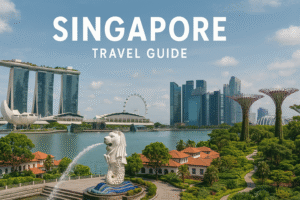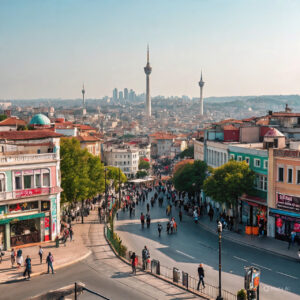Discover the Healing Power of Travel and Escape the Cycle of Burnout
In today’s world of constant deadlines, overbooked calendars, and digital noise, stress has become an unavoidable part of daily life. For many, stress leads to burnout, anxiety, irritability, and even physical health issues. While there are many ways to cope — from therapy to yoga to mindfulness — one of the most underrated but powerful remedies is travel.
In this article, we’ll explore why travel is important for a stressed life, not just as a temporary escape, but as a transformative experience for your mind, body, and spirit.
1. Travel Disrupts the Stress Cycle
Most people live in a loop. Wake up, commute, work, meetings, emails, sleep — and repeat. This repetitive cycle breeds chronic stress, which gradually affects mental clarity and emotional well-being. Travel introduces a much-needed break in this routine.
Changing your surroundings — even for a few days — triggers a mental reset. It removes you from the stress-inducing environments and provides new experiences that stimulate creativity and positivity. This isn’t just a luxury; it’s a necessity in our overworked modern world.
According to psychological studies, novelty stimulates dopamine — the “feel-good” chemical in the brain. That’s why just planning a trip can lift your mood, and stepping into a new environment can significantly lower cortisol levels, the hormone responsible for stress.
2. You Reconnect With Your Natural Pace
One of the biggest causes of stress today is being forced to operate at unnatural speeds. The urgency of deadlines, constant phone notifications, and the pressure to “keep up” leave little time for self-reflection or rest.
Travel slows you down.
When you walk through a quiet village in Bali, sip tea in the Himalayas, or take a long train ride through the Scottish Highlands, your body and mind begin to adjust to a more human pace. This natural rhythm is restorative and vital for managing anxiety.
Even short getaways allow you to wake up without an alarm, enjoy meals mindfully, and truly listen to your thoughts, without rushing.
3. Travel Encourages Mindfulness and Presence
One of the reasons why travel is important for a stressed life is because it forces presence. Whether you’re navigating a street market in Marrakech, hiking a trail in Bhutan, or watching the sunset in Santorini, travel engages your senses completely.
You notice the smell of spices, the sound of different languages, the feel of new textures — and all of it keeps you grounded in the present moment.
Mindfulness — the practice of being present — is one of the most effective tools for stress reduction. When you’re fully immersed in a moment, your brain temporarily shuts off the “overthinking switch.” Travel makes this immersion easy and natural.
4. It Rebuilds Your Emotional Resilience
Resilience is your ability to bounce back from challenges — and it’s often worn thin by daily stress. Travel offers real-life training in resilience.
Delayed flights
Language barriers
Getting lost in a new city
Making decisions on the go
These small discomforts teach adaptability and problem-solving. They help you realize that you are capable of handling more than you think. This confidence, gained through travel, extends far beyond your trip. It strengthens your ability to cope with life’s daily stressors when you return.
5. Nature and New Cultures Soothe the Soul
Several scientific studies have shown that spending time in nature significantly lowers stress levels. Whether it’s forest bathing in Japan, snorkeling in the Maldives, or hiking in Patagonia, being in natural surroundings reduces blood pressure, lowers anxiety, and improves overall mood.
Travel also exposes you to new cultures, customs, and ways of thinking, which can shift your perspective. Seeing how other people live — often more simply or more communally — can spark gratitude and reduce the feeling of being “trapped” in your own problems.
When you see life through a broader lens, your own stress becomes more manageable.
6. Strengthens Relationships and Self-Awareness
Whether you’re traveling solo or with loved ones, the shared experience of travel enhances connection. For couples, it can rekindle intimacy. For families, it builds lasting memories. For solo travelers, it offers a chance for deep self-reflection.
Time away from screens, chores, and office work creates the space to talk, laugh, and enjoy each other’s company — something often lost in our daily rush.
Moreover, travel gives you space to reconnect with yourself. You rediscover your interests, desires, and boundaries. You remember who you are outside of your job title or social roles. And this self-awareness is key to long-term stress management.
7. Boosts Creativity and Motivation
Stress dulls creativity. When you’re constantly under pressure, your brain shifts to “survival mode,” leaving little energy for imagination or innovation. Travel reactivates creativity by exposing you to:
Different colors, patterns, and designs
New music, art, and architecture
Diverse languages and storytelling traditions
This sensory stimulation rejuvenates your creative brain and can help you return to work or life responsibilities with renewed motivation and fresh ideas.
8. Travel Offers Perspective — and Hope
When you feel stuck or emotionally drained, it’s easy to believe your problems are bigger than they are. Travel offers perspective. It reminds you that the world is vast, full of beauty, stories, and hope.
Meeting new people, experiencing different lifestyles, and stepping outside your comfort zone shows you that there is more to life than the stress you’re experiencing now. This perspective can be incredibly healing.
Travel is not just about going somewhere new — it’s about coming back changed.
Practical Tips for Stress-Free Travel
To get the most out of your travel as a stress-relief tool, consider these tips:
Start small: Even a weekend road trip can help.
Avoid over-scheduling: Leave time for rest and spontaneity.
Travel light: Reduce packing stress with essentials only.
Disconnect digitally: Give yourself permission to unplug.
Focus on experiences, not selfies: Let go of pressure to “capture” every moment.
Final Thoughts
Now more than ever, taking a break isn’t optional — it’s essential. The modern lifestyle rewards productivity, but rarely allows for recovery. That’s why travel is important for a stressed life: it creates the space to breathe, reflect, and heal.
So if you’re feeling overwhelmed or emotionally exhausted, consider planning a trip — not as a luxury, but as an investment in your mental health.
Wherever you go, let it be a place where your mind can rest, your heart can expand, and your stress can melt away.
Because sometimes, the best way to find yourself is to get lost.




